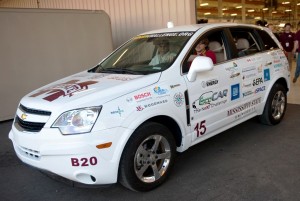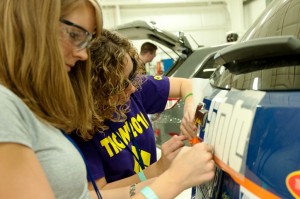Students from Mississippi State University placed first in the 2010 EcoCAR: The NeXt Challenge finals in San Diego today after designing and building a biodiesel extended-range electric vehicle (EREV).
Virginia Tech earned second place with an ethanol-powered EV design. Penn State came in third place with a biodiesel fueled electric vehicle.
Mississippi State beat 15 universities in the second of a three-year competition sponsored by taxpayers via the U.S. Department of Energy and General Motors, ditto on taxpayers providing the money.
During the contest, North American engineering students rework a GM-donated vehicle to minimize fuel consumption and emissions, while maintaining its “utility, safety and performance.”
Mississippi State designed a hybrid with a 21.3 kWh A123 Systems battery pack, which provides an electric range of 60 miles. (Figure on $1,000 per kWh of storage at current prices, less than tuition at some of the schools.) It’s also equipped with a 1.3-liter GM turbo-diesel engine and 75 kW generator in a series plug-in configuration.
During testing, the vehicle’s fuel economy was rated at 118 miles per gallon gas equivalent (combined city/highway cycle). In addition to the overall award, Mississippi State won nine additional awards, including performance events in autocross and acceleration runs.
“This was our most challenging year and stakes were high to have our vehicle ready for inspections. To finish a year of hard work and long hours in first place is an incredible honor for me and my teammates,” said Matt Doude from Mississippi State.
The Virginia Tech EcoCAR team designed an EV with a 40 mile electric range, using a 90 kW Ballard electric motor, 16 kW belted alternator starter and 21.3 kWh battery pack in a split parallel design. They built the vehicle with a 2.4-liter ethanol engine and used 78% less petroleum compared to the baseline vehicle.
Penn State’s car design was also electric. It included a 12.8 kWh battery pack coupled with a GM 110 kW Electric Traction Motor and 75 kW generator. A 4-cylinder 1.3-liter biodiesel engine achieved more than double the fuel economy of the baseline vehicle, or 57 miles per gallon gas equivalent.
“During the last 12 months, these teams faced a difficult challenge – to build an innovative vehicle and continually refine and improve its operation,” said Pat Davis, program manager of DOE’s Vehicle Technologies Program. “These students demonstrated extreme determination and commitment to make their vision a reality, and it is with great pleasure that I congratulate Mississippi State on its outstanding work and well-deserved first-place finish.
EcoCAR is a three-year competition that builds on the 20-year history of DOE advanced vehicle technology competitions by giving engineering students the chance to design and build advanced vehicles that demonstrate leading-edge automotive technologies.
General Motors provides production vehicles, vehicle components, seed money, technical mentoring and operational support.
The U.S. Department of Energy and its research and development facility, Argonne National Laboratory provides competition management, team evaluation, technical and logistical support.


